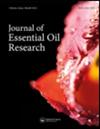Investigation on effects of walnut essential oil against glutamate toxicity on cortex neuron and LN405 cancer cell lines, diabetes, and some microorganisms
IF 2.1
3区 农林科学
Q3 CHEMISTRY, APPLIED
引用次数: 0
Abstract
ABSTRACT In this study, leaf essential oil effects on glutamate toxicity model formed in cortex neurons and LN405 cell cultures were investigated. Antidiabetic activity was evaluated by α-amylase and α-glucosidase inhibitions. MIC was used for antimicrobial activity. Seven groups were examined with MTT. Glutamate 10-5 mM in cortex showed 62% viability whereas oil viability did not increase in a dose-dependent manner and the highest viability rate was observed. There are four types of glandular trichomes in leaf anatomy of walnut. The oil exhibited half as much α-glucosidase inhibitory activity with an IC50 value of 8105 μg/mL, compared to positive control acarbose (IC50 = 4762 μg/mL). MIC of oil was determined to be 625 μg/mL against E. coli, C. albicans, and C. parapsilosis, whereas S. aureus exhibited a MIC of 1250 μg/mL. Major compounds of oil were found as β-pinene (17.6%), α-pinene (11.3%), β-eudesmol (8.6%), and caryophyllene oxide (6.2%).核桃精油抗谷氨酸对皮层神经元、LN405癌细胞、糖尿病及部分微生物的毒性研究
摘要本研究探讨了叶精油对皮层神经元和LN405细胞谷氨酸毒性模型的影响。通过α-淀粉酶和α-葡萄糖苷酶的抑制作用来评价其抗糖尿病活性。MIC法测定其抑菌活性。7组采用MTT检测。谷氨酸10-5 mM在皮层的存活率为62%,而油的存活率不随剂量增加而增加,其存活率最高。核桃叶片解剖中有四种类型的腺毛。与阳性对照阿卡波糖(IC50 = 4762 μg/mL)相比,其α-葡萄糖苷酶抑制活性为8105 μg/mL。结果表明,精油对大肠杆菌、白色念珠菌和假丝酵母菌的MIC为625 μg/mL,对金黄色葡萄球菌的MIC为1250 μg/mL。主要化合物为β-蒎烯(17.6%)、α-蒎烯(11.3%)、β-桉树酚(8.6%)和石竹烯氧化物(6.2%)。
本文章由计算机程序翻译,如有差异,请以英文原文为准。
求助全文
约1分钟内获得全文
求助全文
来源期刊

Journal of Essential Oil Research
工程技术-食品科技
CiteScore
6.00
自引率
3.30%
发文量
52
审稿时长
18-36 weeks
期刊介绍:
Journal of Essential Oil Research ( JEOR) is the major forum for the publication of essential oil research and analysis. Each issue includes studies performed on the chemical composition of some of the 20,000 aromatic plants known in the plant kingdom. JEOR is devoted entirely to all phases of research from every corner of the world by the experts in their field. JEOR''s main areas of focus include:
-Analytical chemistry-
Biological activity-
Biotechnology-
Chemical composition-
Chemical synthesis-
Chemosystematics-
Microbiological activity-
Plant biochemistry/biosynthesis-
Toxicology.
Published six times per year, JEOR provides articles on the aromatic principles of a plant or its isolates and are directed toward furthering our readers'' knowledge of the aromatic plant and animal kingdoms.
 求助内容:
求助内容: 应助结果提醒方式:
应助结果提醒方式:


